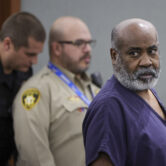MANHATTAN (CN) – A federal jury convicted a Hong Kong businessman on Wednesday for his role in a more than $2 million bribery scheme that involved two African autocrats – and implicated former presidents of the U.N. General Assembly.
Deliberations had barely begun this morning before the jury found that Chi Ping Patrick Ho, the head of a think tank tied to CEFC China Energy, corrupted the leaders of Chad and Uganda. Prosecutors said that Ho arranged for a $2 million bribe to Chad President Idriss Deby, as well as $500,000 apiece to Uganda President Yoweri Museveni and Sam Kutesa, his foreign minister.
A jury found Ho found guilty of five violations of the Foreign Corrupt Practices Act and two counts of money laundering.
The sole count on which Ho was acquitted, a money-laundering conspiracy, involved CEFC’s payments to Chad’s president.
At trial, Senegalese diplomat Cheikh Gadio said that Ho’s delegation at CEFC paid this bribe to Deby with several gift boxes stuffed with cash inside Chad’s presidential palace in 2014.
“That is a quintessential bribe,” Assistant U.S. Attorney Douglas Samuel Zolkind said during closing arguments on Tuesday. “It’s a classic – like something out of a movie.”
Gadio, who arranged Ho’s summit with Deby through his consulting company Sarata, testified that he had a meeting with Ho inside the United Nations-adjacent Trump World Towers.
CEFC’s subsidiary owned unit 78B inside that building, a magnet for foreign cash brimming with Russian oligarch tenants.
Evidence at trial implicated two successive ex-U.N. General Assembly presidents: Kutesa and John Ashe.
Kutesa has not been charged, but Ashe was indicted in a related scheme before he died in an apparent weightlifting accident.
More than three years have passed since ex-U.S. Attorney Preet Bharara started his anti-corruption crackdown at the United Nations with Ashe’s indictment, and it has continued with his successors Joon Kim and Geoffrey Berman.
Berman, the current U.S. attorney for Manhattan, celebrated Ho’s conviction in a statement.
“As the jury’s verdict makes clear, Ho’s repeated attempts to corrupt foreign leaders were not business as usual, but criminal efforts to undermine the fairness of international markets and erode the public’s faith in its leaders,” he wrote.
‘A Network of Middlemen, Millionaires and Suspected Spies’
As the secretary general of China Energy Funding Committee – a U.S. and Hong Kong-registered charity with United Nations accreditation – Ho was supposed to be the corporation’s philanthropic face. But trial revealed the think tank doubling as a front for CEFC’s corporate designs. Ho reported back to CEFC’s chairman Ye Jianming in regular briefings that he marked “highly confidential” and “super urgent.”
Officially an energy company, CEFC also lists financial services among as a “core business,” but trial showed the conglomerate pursuing various other side businesses in Africa. Evidence showed that Ho considered purchasing banks in Africa like Barclays and offered to sell arms to Chad, a country with a checkered human rights record locked in conflict with the militant group Boko Haram.
“Quick deal: 200M USD up front for 10% rights, plus some arms and renminbi discount loans,” Ho fired off in one text message to Gadio, placing a bid on Chad’s oil fields for cash, weapons and discount loans on Chinese currency.








